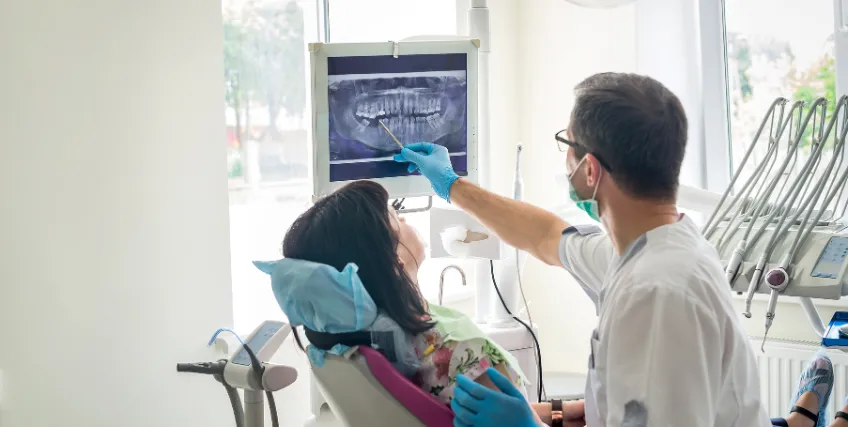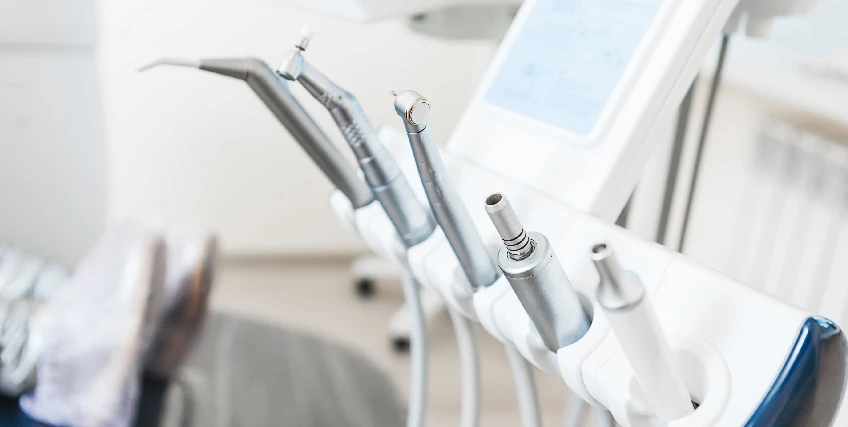Loans for Dentists to Buy an Existing Dental Practice
September 2, 2025 | Last Updated on: September 2, 2025

For many dentists, opening their own private practice is a career-defining goal. Starting a new practice from scratch is exciting, but it can be more practical and advantageous to acquire an existing one instead. An existing dental practice already has an established patient base, a trained staff, and a reputation that has been years in the making. It can help you hit the ground running and bypass some of the biggest challenges of launching a startup.
The cost of buying an existing practice can be significant, however. Given the cost of physical assets like equipment and real estate, as well as the intangible value of the practice's patient records and brand, an existing dental practice will likely cost at least $500,000. That's where loans for dentists come in.
Understanding the best dental financing options available to you is essential to make the process smoother and more affordable. Here, we'll walk you through the primary types of loans for dentists and how to best prepare for the application process.
In this article:
- Discover the appeal of buying an existing practice vs. starting a new one.
- Explore the top loans for dentists, including dental loans for low income and dental loans with no credit check.
- Understand the application process on loans for dentists and how to improve your credit approval chances.
Why Buy an Existing Dental Practice?
Before getting into the specifics of practice financing, it's important to recognize why buying an existing practice is a more financially sound decision than starting a new one. In either case, you'll likely need to explore loans for dentists given the high cost of starting any business. From a lender's perspective, however, it's far less risky to buy an existing practice with a track record and a proven history of cash flow than to start something from scratch.
Lenders can analyze a practice's financial history to project future income, making them more confident in your ability to repay the debt. The loan amount will be easier to repay when you immediately have revenue coming in, which may translate to more favorable loan terms, like lower dental practice loan rates or a longer repayment term.
In addition to the better chances of getting approved for a small business loan, you'll also get:
- Existing patient base: You won't have to spend years and large sums of money trying to attract a customer base in a competitive dentistry market.
- Existing staff: An experienced team can save on hiring and training costs and provide the benefit of pre-existing relationships with patients.
- Built-in systems: An existing practice already has operational systems in place, from scheduling software to billing procedures, saving you the time and money it costs to set everything up yourself.
Types of Financing Options and Loans for Dentists
When you're ready to seek financing, you'll typically have options between three different types of lenders, each of which can offer various loan options.
Traditional Bank Loans
Traditional banks and credit unions offer a variety of loan programs to support business acquisitions or provide loans for dentists. Usually, these traditional financiers have strict eligibility requirements and are not a good option for dental loans for low income or bad credit. They often have longer underwriting times and approval processes than online lenders but usually can offer better annual percentage rates (APRs) and higher loan amounts.
Loans for dentists could include conventional term loans, commercial real estate loans to buy the property, equipment financing to purchase just the practice's equipment, or a business line of credit to provide flexible funding over time as you get up to speed managing the business.
In addition to the longer funding times, traditional banks may have higher down payment requirements and require you to work with a generalist bank loan officer who doesn't understand the nuances of the dental industry.
Online Lenders
While there are many generalists financial institutions that can help you acquire a business, a growing number of specialty lenders work with healthcare professionals, particularly dentists. Specialty lenders have a deep understanding of the industry and can be a strong choice when looking for loans for dentists.
Online lenders can deliver industry expertise and customized solutions that are more aligned with your specific needs, such as a grace period for interest payments during the first few months of transition. While they can offer many of the same loan options as traditional lenders, they may be able to do so with a more streamlined application process that leads to faster funding. However, this often comes at the cost of higher fixed rates and monthly loan payments.
SBA Lenders
The U.S. Small Business Administration (SBA) works with lenders to partially guarantee small business loans. These can be great loans for dentists as they have lower risks to lenders and borrowers alike due to the government guarantee. The government backing allows banks to offer more flexible and favorable terms than they might otherwise.
The two most common SBA loan programs that could be used as loans for dentists to buy a practice are the SBA 7(a) and SBA 504 loan programs.
- SBA 7(a): The most flexible and widely used SBA loan program can be used to finance a wide range of costs associated with buying a practice, including the purchase price, working capital, and equipment.
- SBA 504: This SBA loan program is designed to purchase major fixed assets, like commercial real estate or large equipment. It's structured between three parties: a bank, a Certified Development Company (CDC), and the borrower. This can be a great option if you want to buy the building as well as the practice.
SBA loans have a range of benefits, including low down payments, longer repayment terms, and some of the most competitive interest rates on loans for dentists. However, they tend to have long application processes and require extensive paperwork, from personal and business tax returns to a detailed business plan.
What Do Loans for Dentists Cover?
Loans for dentists can go beyond just the purchase price of the business. A comprehensive loan can also support:
- Working capital needs: A loan can provide a working capital buffer to cover initial operating expenses before the practice's cash flow stabilizes.
- Renovations: An older practice may be in need of renovations or technology upgrades, and a loan can help cover those costs.
- Refinance debt: Some loans can be used to consolidate existing personal debt, like dental student loans, into your practice loan. That can simplify your monthly payments and could lower your interest rate.
- Closing costs and legal fees: Some loans for dentists can be structured to cover the fees associated with buying the business, including legal, accounting, and broker fees.
How to Prepare for a Loan Application
The more prepared you are, the smoother the loan application process should be. Before you apply, here are some good steps to take:
- Strengthen personal finances: Lenders will look at your personal credit history, so the higher your credit score, the better. Paying down high-interest personal debt and getting your personal financial records in order can boost your chances of approval and streamline the process.
- Get a practice valuation: You need a third-party, professional valuation of a business before you go to a lender. They need to understand the business's true value before approving a loan.
- Create a solid business plan: A crucial part of getting a loan for dentists is to have a strong business plan. The existing practice may have a solid foundation, but you should be able to show a vision for the future to grow the business and repay the loan.
- Get organized: When you apply for a loan, you'll likely need your personal credentials, including your DMD license, personal and business tax returns, bank statements, and a detailed list of your assets and liabilities. Having all of this ready can streamline the process.
- Get prequalified: Many lenders allow you to prequalify for loans to give you a better idea of your borrowing power. It also makes you a more credible buyer when you make an offer to a seller.
Final Thoughts
Buying an existing dental practice can be a major step in a dentist's career. It's an opportunity to take control of your professional life and secure your financial future. The upfront costs may be significant, but the best dental financing options can give you the support you need to realize your dream.
FAQs About Loans for Dentists
How long does the loan process for a dental practice typically take?
The timeline varies depending on the type of loan. A conventional bank loan may take a few weeks to more than a month. SBA loans, due to the additional paperwork and government oversight, may take a few months. Online lenders tend to offer the fastest timelines, with decisions often within one month.
Do I need a down payment to buy a dental practice?
Most lenders require some form of a down payment to show that you have “skin in the game.” The amount of down payment required depends on the lender and type of loan.
Can I get a loan if I'm a recent dental school graduate with high student loan debt?
It's possible, but more likely with a specialty lender than a conventional one. While any lender will factor your debt-to-income ratio into their decision, some may be willing to work with new doctors with a strong business plan, given the high earning potential of a dental practice.
What is "goodwill," and can I finance it with a loan?
Goodwill is the intangible value of a business's reputation, brand name, and customer base, and it's very important for purchasing an existing business. If you're looking for loans for dentists, lenders will want to assess an existing practice's goodwill.
What are some common mistakes dentists make when applying for a loan?
Some of the most common mistakes include not getting a professional practice valuation, failing to create a business plan, and not shopping around for the best loan terms.
Frequent searches leading to this page
Term Loans are made by Itria Ventures LLC or Cross River Bank, Member FDIC. This is not a deposit product. California residents: Itria Ventures LLC is licensed by the Department of Financial Protection and Innovation. Loans are made or arranged pursuant to California Financing Law License # 60DBO-35839




